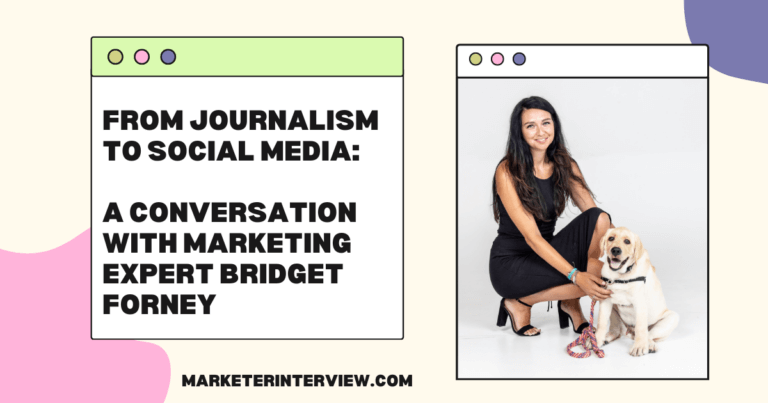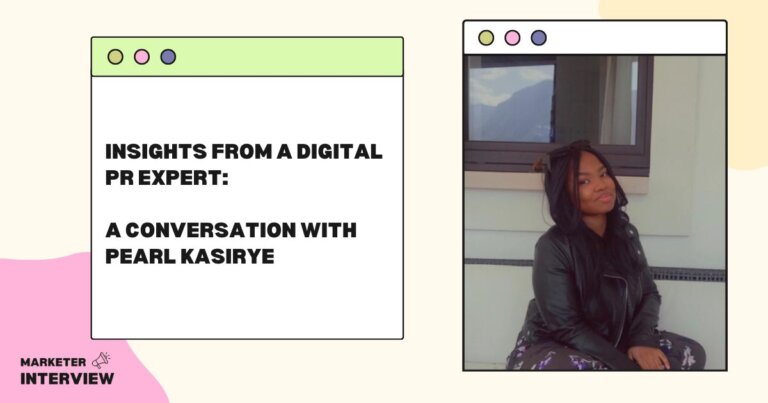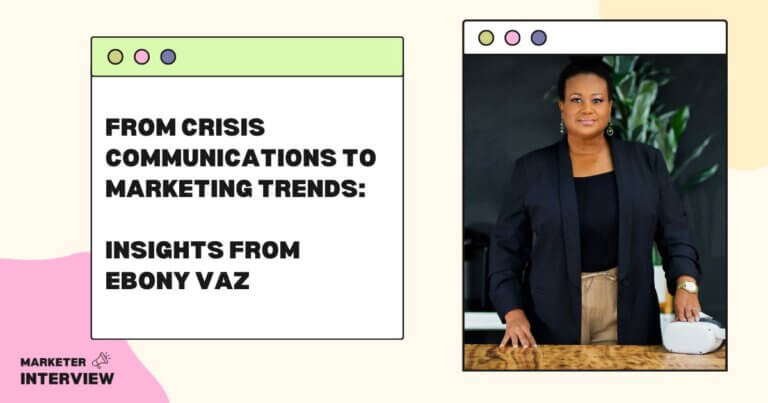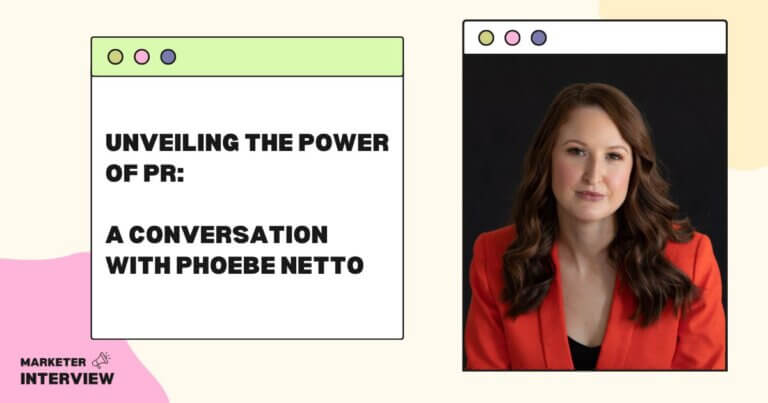Power of PR & Communications: Insights from Bianca Dorobantu
Welcome to Marketer Interview, the leading blog for insightful discussions with top marketers worldwide.
In this edition, we have the privilege of interviewing Bianca Dorobantu, a talented Freelance PR & Communications Specialist passionate about startups, technology, and storytelling.
With a background in journalism and a wealth of experience in the media business, Bianca brings a unique perspective to the field of PR and communications. She has worked with numerous innovative tech companies, helping them amplify their voices and establish strong brand narratives.
Join us as we explore Bianca’s journey, expertise, and insights into the dynamic realm of PR and Communications.
Contents
- 1 Can you share how you transitioned from journalism to PR and communications with us? What attracted you to this field?
- 2 With your experience at renowned business media outlets, what key lessons did you learn about effective storytelling for brands?
- 3 As a PR and communications consultant, what unique challenges do startups and tech companies face in building brand awareness and reputation?
- 4 How do you craft a compelling brand narrative for a startup or tech company? Are there any specific strategies or techniques you find particularly compelling?
- 5 In your opinion, what role does content marketing play in enhancing a brand’s visibility and credibility? How do you integrate it into your PR and communications strategies?
- 6 Can you share an example of a successful PR campaign you worked on for a tech startup? What were the goals, tactics, and outcomes?
- 7 As a freelancer in the PR industry, how do you stay updated with the latest trends and developments? Are there any resources or communities you find particularly valuable?
- 8 What common misconceptions about PR and communications in the startup and tech world? How do you address and overcome them?
- 9 Please tell us any essential tools or software you rely on to streamline your work and achieve better results in your PR and communications efforts.
- 10 What advice would you give aspiring PR and communications professionals interested in working with startups and tech companies?
- 11 What trends do you foresee in PR and communications for startups and tech companies? How do you think these trends will shape the industry?
The move into PR & communications is common for a journalist, so it was a natural transition for me. Once you understand what makes a good news story and how the media works, embracing a PR career is not difficult. I wouldn’t have been a good PR professional if I hadn’t been a journalist.
Back in May 2020, I thought it might be the right time to start the freelancing journey, which has taught me the most powerful lessons, both professionally and personally.
Although PR is a challenging industry, especially when you are self-employed, I enjoy the variety and excitement of my work. Teaming up with many companies on challenging projects keeps me learning and growing, allowing me to put ideas into practice.
I have always been a storyteller and curious, so 3 years ago, I took a new turn in my career. As a PR professional, I still tell stories from a different perspective. Telling the correct narratives can inspire other ambitious people to change our world.
With your experience at renowned business media outlets, what key lessons did you learn about effective storytelling for brands?
Brands use storytelling to create a unique identity, connect with their target audience and differentiate themselves from the competition.
One of the lessons learned about storytelling is that authenticity is essential to building trust with audiences. If you are a business owner, be transparent and honest in your storytelling. Avoid exaggerated claims or misleading information, as consumers are becoming increasingly savvy and can quickly spot inauthenticity.
Journalists want to know the ‘why’ behind the business, what problem it can solve, and what makes it unique. They are also interested in the founder’s unique vision on a particular issue and the struggles and insights into the journey. Facts and figures are also essential.
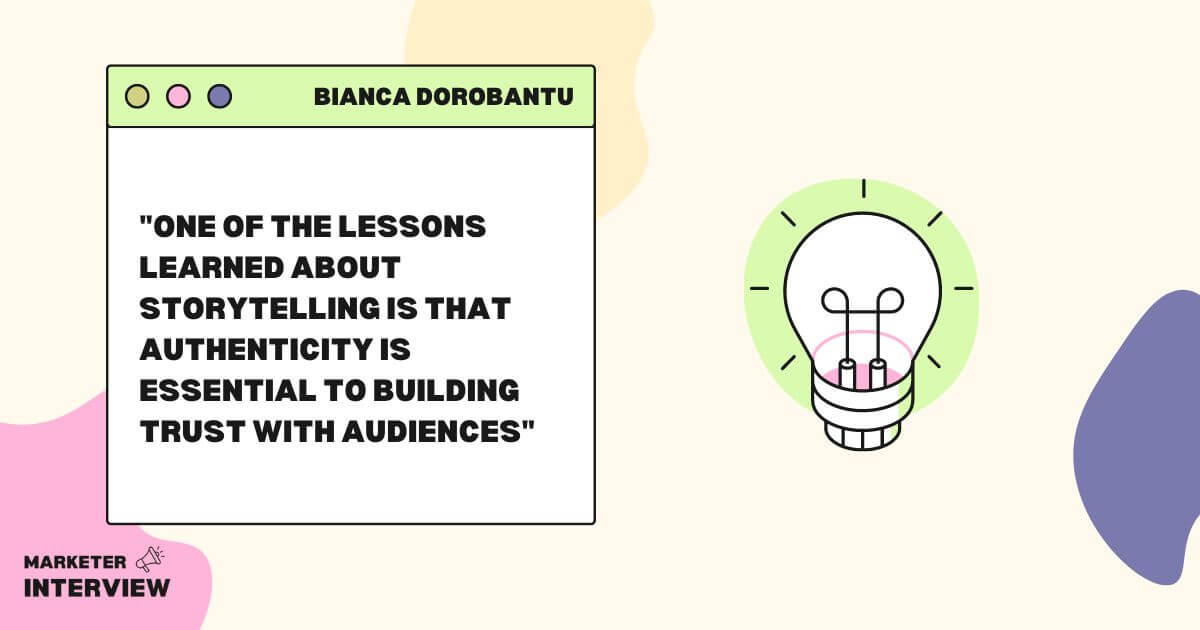
As a PR and communications consultant, what unique challenges do startups and tech companies face in building brand awareness and reputation?
Challenge #1 is limited resources.
Startups often have limited financial and human resources compared to established companies. Building brand awareness and reputation requires some investment, which can stretch the resources of a young company. But it also means that teams can find innovative approaches and ideas to achieve their goals.
Challenge #2 is facing incumbent competition. The tech industry is saturated with established players with strong brand recognition and customer loyalty. Competing against these well-known companies can be difficult for startups trying to carve out their niche.
Challenge #3 is information overload. Now, consumers are bombarded with information from multiple sources. Cutting through the noise and getting your message heard can be a challenge.
Overcoming these challenges requires a well-thought-out brand strategy, innovative marketing approaches, and a commitment to delivering on promises.
How do you craft a compelling brand narrative for a startup or tech company? Are there any specific strategies or techniques you find particularly compelling?
First, I ask many questions and do a lot of research to understand what the company does (in the start-up world, this can be a real challenge) and how the competition communicates. Then, I use a guideline with some specific techniques that include:
- Defining the brand identity: start by clearly defining your brand identity, including your mission, vision, values, and unique selling proposition (USP). Understand what makes your company different from the competition and what value you bring your customers.
- Knowing the audience: understand your target audience’s needs, pain points, and aspirations. Tailor your brand narrative to resonate with their interests and create an emotional connection.
- Creating a memorable story: tell how your company was born, the challenges you faced, and the passion that drives your team.
- Focusing on communicating how the company solves a specific problem: highlight the problems your product or service addresses and show how your innovation can positively impact people’s lives or businesses.
- Using customer success stories: show real-life examples of how your product or service has benefited your customers, such as success stories, testimonials, and case studies.
- Avoiding technical jargon that can alienate non-expert audiences: craft your brand narrative using simple and accessible language that everyone can understand. Focus on establishing a clear and coherent message that aligns with your brand values and positioning.
- Being authentic and transparent: As mentioned above, authenticity is critical to establishing trust with your audience. Be genuine and transparent.
In your opinion, what role does content marketing play in enhancing a brand’s visibility and credibility? How do you integrate it into your PR and communications strategies?
Content marketing is vital in increasing a brand’s visibility and credibility. By providing helpful information and addressing the needs of potential customers, content marketing can position a brand as a trusted authority in its industry.
For example, content marketing allows a brand to educate and inform potential customers about its products or services. Addressing their pain points and demonstrating how the brand’s features can solve their problems leads to credibility.
Content marketing also allows brands to engage their audiences across platforms. Producing content that resonates with customers’ interests and needs helps companies foster meaningful connections, leading to greater loyalty.
How I manage to integrate content marketing into PR and communications strategies:
Media outreach: compelling content can be used for media outreach efforts. Press releases, studies/reports, and industry insights can be shared with journalists to secure media coverage.
Thought leadership: a brand can share valuable insights, industry trends, and expert opinions. By consistently providing valuable information, a company can position itself as a thought leader.
By integrating content marketing into PR and communications strategies, a brand can create a unified and powerful approach to increasing visibility and credibility in its industry.
This year in May, I worked with SOLO, Romania’s first 100% digital sole trader management service, to announce a new free platform feature that non-existing clients could use.
The aim was to sign over a thousand people to use the tool. Our tactics included a press release and media interviews designed to position SOLO as a trusted source in the industry. Through marketing efforts supported by PR, we convinced the target audience to use the tool.
As a freelancer in the PR industry, how do you stay updated with the latest trends and developments? Are there any resources or communities you find particularly valuable?
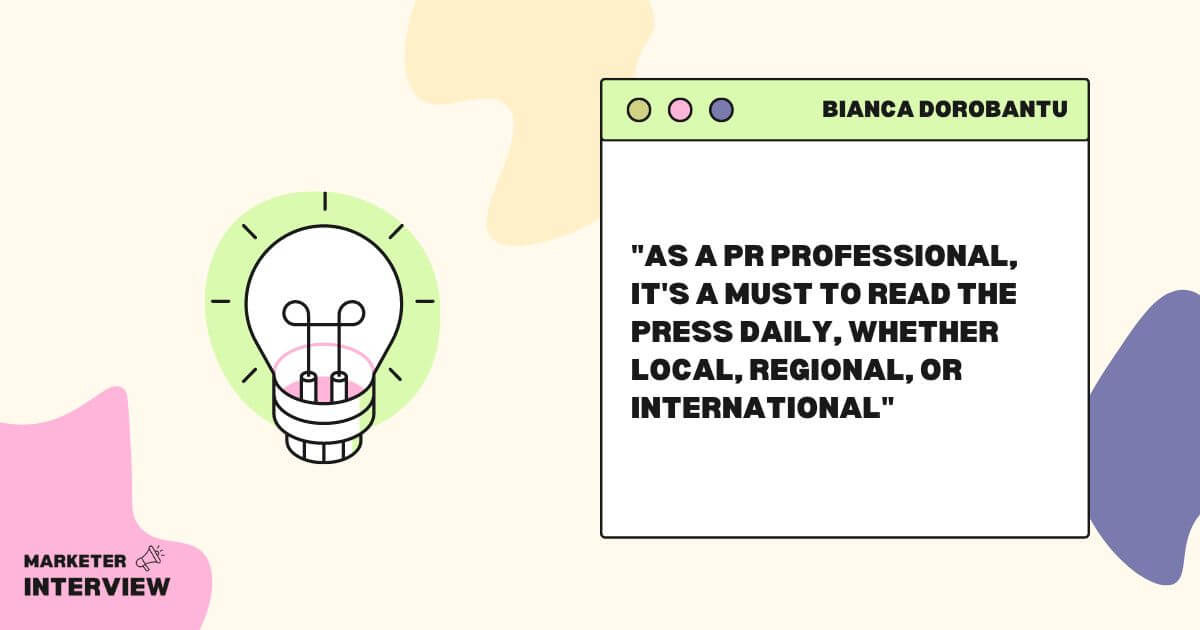
As a PR professional, it’s a must to read the press daily, whether local, regional, or international. I like to read about different niches: business, technology, start-ups, social, political, etc.
I often read PRWeek, PR Daily, The Drum, Campaign, and Adweek for PR and marketing-related content. I also follow industry websites that regularly publish articles, insights, and updates on the marketing landscape, such as Hubspot, Content Marketing Institute, Search Engine Journal, Social Media Examiner, etc.
I read the newsletters of prominent PR experts, such as The Exclusive – PR Daily by Stephen Karaolis and Comms All Ye Faithful w/John Forberger, and I listen to Jen Berson’s Pitching Powerhouse podcast. I also follow top professionals on LinkedIn.
From time to time, I attend local industry conferences and face-to-face events, as well as some online webinars. As a solopreneur, I need to be part of a community, so I am a member of various freelancer Facebook groups and attend regular meetings for professionals working in different industries.
What common misconceptions about PR and communications in the startup and tech world? How do you address and overcome them?
That is a fascinating question. I will list some of them:
1. PR is just about press releases and media coverage
PR is much more than that. It involves building stakeholder relationships, managing crises, crafting compelling narratives, and engaging with audiences across multiple channels.
2. PR is only for companies with big budgets
PR is essential for startups and tech companies of all sizes. While large companies may have more resources, startups can still benefit from PR by focusing on targeted media outreach, leveraging social media, and telling compelling stories about their innovations and successes.
3. PR is a one-off effort
PR is an ongoing process, not a one-off event. Building brand awareness, credibility, and trust takes time and consistent effort. Startups should develop a long-term PR and communications strategy aligned with their business objectives and continually adapt it.
4. PR results are immediate
PR results often take time to materialize and can be challenging to measure directly. Unlike advertising with immediate ROI metrics, the impact of PR can be seen in brand reputation, thought leadership, and long-term relationship building. Startups should set realistic expectations and track qualitative indicators such as media mentions, sentiment analysis, and audience engagement.
To overcome all these misconceptions, startups should invest in building a solid PR and communications foundation from the early stages. To do this, it’s essential to work with experienced PR professionals or agencies that understand all the nuances of the startup ecosystem.
Please tell us any essential tools or software you rely on to streamline your work and achieve better results in your PR and communications efforts.
My favorite tools are Cision, HARO, Meltwater, Canva, Grammarly, DeepL Translate & DeepL writing, and Todoist as a task manager.
What advice would you give aspiring PR and communications professionals interested in working with startups and tech companies?
- Understand the startup and tech landscape and be curious. Familiarize yourself with the ecosystem. Stay updated on the latest trends, innovations, and key players. Knowing the industry will make you a more effective communicator and strategist for your clients.
- Learn to tell compelling stories: storytelling is essential in PR and communications. Learn how to craft narratives that resonate with your target audience and highlight the unique aspects of the startup or tech company you’re representing. Emphasize the problem-solving aspect and the impact of their innovations.
- Network and build relationships: networking is crucial in PR. Attend industry events, conferences, and meetups to connect with startup founders, tech executives, journalists, and other professionals. Building strong relationships will open doors to opportunities.
- Be proactive and creative: startups often have limited resources, so identify opportunities for media coverage, thought leadership, and partnerships. Think creatively to develop innovative PR strategies that stand out in the competitive tech landscape. Read the press – as much and as varied as you can- daily.
- Demonstrate problem-solving skills: startups face unique challenges, and as a PR professional, you may need to help them navigate crises or reputation issues. Showcase your problem-solving skills and ability to manage communications during difficult times.
- Stay up-to-date with trends: familiarize yourself with PR tools, software, and industry best practices. Keep an eye on emerging PR trends and technologies to remain competitive.
What trends do you foresee in PR and communications for startups and tech companies? How do you think these trends will shape the industry?
The use of interactive and multimedia content: companies use various content formats such as videos, infographics, and live streams to engage their audience effectively. Interactive content encourages active participation, while multimedia content can convey complex ideas more engaging and digestibly.
Real-time communication and crisis management: with the rapid spread of information on social media and digital platforms, companies must respond quickly to any issues or crises. Real-time communication strategies and crisis management plans are becoming essential to protect the brand’s reputation and maintain transparency.
Personalization and targeted messaging: PR professionals tailor their messages to specific audiences and segments. Brands use data and customer insights to deliver personalized content and experiences, which can increase engagement and foster brand loyalty.

